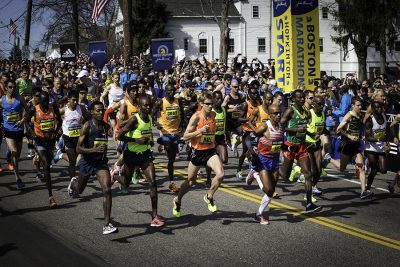
Five years ago, the Boston Marathon bombing became one of the most shocking tragedies in the United States’ recent history. But instead of wallowing in sorrow, the city bounced back and made 2014’s marathon one to remember.
That’s the message behind “Boston,” a new documentary from director Jon Dunham, narrated by Matt Damon, that follows the city’s journey to the 2014 marathon while tracing the race’s fascinating history. The film intersperses real historical footage from past marathons with interviews with dozens of organizers, runners and spectators, making it a fascinating watch.
The best part of the film is how it seamlessly transitions between modern-day footage leading up to the 2014 race and historical footage, including interviews with previous champions and historians. It becomes obvious from the very beginning that the marathon is Boston’s biggest annual event and part of the reason why it’s such a famous city.
As college students, those of us who aren’t from Boston probably don’t know a lot about the city’s history, much less the history of the marathon, but it was fun to learn about Bostonians who became celebrities by winning the marathon multiple times and seeing how the race course has changed over the years, up until its current course which goes through eight cities.
We usually just think about the end of the race, the part that goes through Brookline and Kenmore Square and ends at Copley Square, but the entire 26.2 mile course actually covers a lot more of Greater Boston than one might think.
The filmmakers did a great job covering details about the race that nobody else would have thought to talk about, from looking at the uncomfortable shoes runners wore in the early 20th century to going out early in the morning and interviewing the workers who repainted the finish line. It’s details like these that make the biggest impact and show that the producers worked hard to include as many facets of the race as possible.
One thing that becomes painfully obvious early in the movie is how white and male Boston Marathon runners have historically been.
At one point, the movie shifts focus to talk about Bobbi Gibb and Kathrine Switzer, two of the first women to finish the race. This part was inspirational, to be sure, but it still did not feel like enough compensation for all the white men being interviewed.
This is not the filmmakers’ fault, though, since women were not officially allowed in the race until 1972, and there were 75 marathons before that to cover, with 75 male winners.
Another aspect that felt a bit off was a few minutes where the film focused on a running group for indigenous Australians started by a previous Boston Marathon champion. This part felt out of place and irrelevant to the rest of the story, only tangentially related to the charitable aspect of the race, and a strange way to incorporate more people of color. It was still interesting, though, and seeing the Australian outback was a nice break from footage of Boston.
The best part of “Boston” is the focus on the planning for 2014’s marathon. The producers interviewed a few survivors and included footage of the 2013 bombing.
The storytelling in this section is fantastic. The producers weave together a few different people’s narratives of what happened in 2013 to paint a picture of what it was like to be at various points in the race. They even got footage of one runner who was almost to the finish line when the first bomb went off, and his narrative of what happened overlays the video, making for a very powerful scene.
Instead of focusing on how tragic the 2013 events were, the movie quickly but respectfully shifts focus to preparations for the 2014 race. Instead of creating a somber tone, the film turns wound up being educational as we follow the race organizer, police commissioner and other volunteers who helped make the success of 2014’s race possible.
As a college student who didn’t know a lot about the history of the Boston Marathon before coming here for college, watching “Boston” taught me what makes the marathon so special and gave me a newfound sense of pride in and love for this city that can seem cold and unwelcoming at times.























































































































